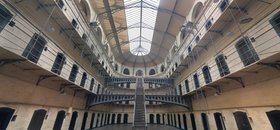Time to decarbonize 'critical infrastructure'

Writing in The Advocate (Baton Rouge and New Orleans), Member Scholar Karen Sokol observes that, " During the pandemic, the [energy] industry is using its 'critical infrastructure' status to further accelerate its polluting activities. The industry asked the Trump administration for an indefinite suspension of its obligations to comply with basic environmental and public health protections even though communities near polluting facilities have suffered higher death rates from COVID-19. The administration responded quickly, depriving communities of these vital safeguards with no clear date for reinstating them."
Read PDF
Author(s): Karen Sokol
Comments on EPA 'Censored Science' Rule

In comments to the EPA on its proposed 'Censored Science' rule, CPR's Goodwin and Minovi write, "EPA’s rulemaking rejects widely accepted scientific standards and will allow the agency to cherry-pick studies that align with the administration’s agenda ... [and] will be prohibitively costly to the agency, both in terms of taxpayer dollars and the unnecessary and avoidable harms to public health and the environment. Furthermore, the EPA has incorrectly identified ... the legal authority for this rulemaking."
Read PDF
Author(s): James Goodwin, Darya Minovi
Comments to OSHA on Improving the Whistleblower Protection Program

Comment letter to OSHA ahead of its Whistleblower Stakeholder Meeting on May 12, 2020, providing recommendations on how the agency can address key issues and improve its administration of the Whistleblower Protection Program.
Read PDF
Author(s): Katie Tracy
As coronavirus infections peak, profit-driven hospital systems must be held accountable

In the Boston Globe, Shalanda Baker and colleagues write that "The announcement that Carney Hospital in Dorchester would become the country’s first dedicated COVID-19 hospital was largely hailed as a welcome expansion of hospital capacity in response to the outbreak. This hospital normally serves as a safety net for low-income residents in Dorchester.... Although it is unclear whether [this and similar hospital sitings] put the surrounding communities at greater risk of infection, they follow a broader pattern emerging in COVID-19 hot spots. As New York, Boston, and other jurisdictions decide where to erect makeshift hospitals, stakeholders must remain vigilant regarding this pattern of burdening low-income communities and communities of color. This oversight is especially needed in the case of for-profit entities.
Read PDF
Author(s): Shalanda H. Baker
Our Chemical Regulatory Program Is Broken. Here’s How to Fix It.

Writing in Undark, CPR Member Scholar Wendy Wagner and co-author Will Walker write that the existing framework for chemical regulation puts too much burden on EPA and too little on manufacturers.
Read PDF
Author(s): Wendy Wagner
Webinar: Climate Justice: Vulnerability and Resilience to COVID-19 and the Climate Crisis

On CPR's April 29, 2020, webinar, participants will hear from leading experts on pandemics, public health, and climate change, as part of our series of Climate Justice webinars. Dr. Monica Schoch-Spana is an expert in epidemic and disaster management, with decades of experience advising federal, state, and local officials on health security. Dr. Aaron Bernstein brings experience as a pediatrician on the front lines and cutting-edge expertise on the intersection of public health and climate change. Finally, seasoned environmental lawyer and CPR Member Scholar Daniel Farber offers expertise in legal and policy tools, such as the Stafford Act, that may be used to help protect vulnerable communities from bearing the greatest burden of the pandemic.
Read PDF Read Online
Author(s): Daniel Farber, Darya Minovi
Opinion analysis: The Justices' purpose-full reading of the Clean Water Act

Writing for SCOTUSBlog, CPR's Lisa Heinzerling discusses the Supreme Court's April 2020 ruling in a Clean Water Act case from Hawaii. The ruling requires a permit when a point source of pollution adds pollutants to navigable waters through groundwater, if the addition of pollutants is "the functional equivalent of a direct discharge" from the source into navigable waters. She writes that "Perhaps the most striking feature of Justice Stephen Breyer's opinion for the majority is its interpretive method. The opinion reads like something from a long-ago period of statutory interpretation, before statutory decisions regularly made the central meaning of complex laws turn on a single word or two and banished legislative purpose to the interpretive fringes."
Read Online
Author(s): Lisa Heinzerling
Censored Science Rule Virtual Hearing Testimony

Testifying at a virtual hearing hosted by the Union of Concerned Scientists, James Goodwin laid bare the feeble legal underpinnings of EPA's "censored science" rule.
Read PDF
Author(s): James Goodwin
Parole Hearings Should Be Resumed for Public Health

Writing for AL.com, Heather Elliott calls on the Alabama Director of the Bureau of Pardons and Paroles to resume holding parole hearings amidst the coronavirus pandemic, and to do so electronically, in light of the governor's order waiving face-to-face hearing requirements. She notes that an outbreak of coronavirus in a prison setting could lead to many unnecessary deaths.
Read PDF
Author(s): Heather Elliott
Virus provides lessons on government, science and politics

Joseph Tomain, writing in the Cincinnati Enquirer, discusses lessons to be learned -- so far -- from the coronavirus pandemic.
Read PDF
Author(s): Joseph Tomain
